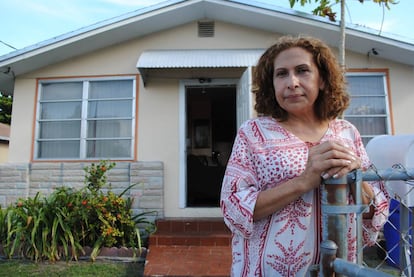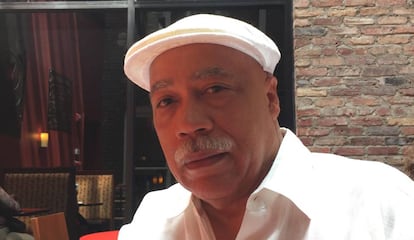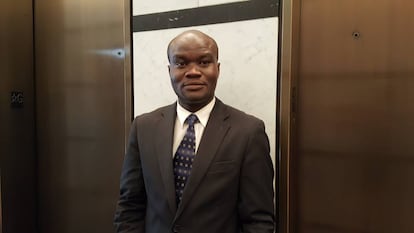US health care: when your life is on the line
Millions of Americans could lose their health coverage if Republicans manage to repeal Obamacare. To many, this literally means the difference between life and death. Here are some of their stories

María Edith Lau prays that it will not happen. Yaya Kone is thinking about moving back to Côte d’Ivoire in West Africa. Bill Knox is looking at coming out of retirement. And Kaeley Pruitt-Hamm wonders if she will even survive. They all share the same fear: that former US president Barack Obama’s health reform will get repealed. Republicans, with Donald Trump at the helm, want to vote in an alternative system that will nix many of Obamacare’s achievements and leave millions of people without coverage, according to independent estimates. Although not every part of the Affordable Care Act can be dismantled, if the Republican vote prospers it will tear down the pillars of a system that has brought medical insurance over the last seven years to some 20 million people who used to go without.
In a country where there are still around 29 million citizens without any kind of health insurance, the future of Obamacare has become an issue of enormous significance. Democrats, backed by medical and social organizations, fiercely defend the current system. While admitting that it has flaws and tremendous inefficiencies that need fixing, they hold that it is a giant step forward from the previous situation, and say it provides relief for millions of needy Americans.
But Republicans have made Obamacare a symbol to destroy, a monument to the excesses of bureaucracy and government interference. Yet so far, they have been unable to come up with a working alternative of their own. And therein lies Obamacare’s only hope.
On Monday, two more Republican senators announced that they would oppose the Senate Republican bill to repeal the Affordable Care Act, bringing the total to four and effectively halting the legislative overhaul – for now.
Republican lawmakers may try to rewrite the bill again. The Senate Republican leader, Mitch McConnell, is now talking about bringing down Obamacare based on a 2015 proposal. Trump himself has called for a new project, starting with “a clean slate.”
Until the matter is resolved, people like María, Yaya, Kaeley and Bill will continue to fear for their own future.
These are their stories:
María Edith Lau, 53: “I was saved by God and Obamacare”
María Edith Lau has a plastic box where she keeps the bills for the treatments that saved her life and which she would not have been able to afford without Obamacare. “I figure it was around $50,000,” says Lau, a native of Nicaragua who is now a US citizen and a cancer survivor.
Lau arrived in the US in 1993 and for the first 20 years she had no medical insurance at all. In 2013, thanks to Obamacare, she obtained her first subsidized coverage. She did not need to use it until 2016, when she was diagnosed with colon cancer. “I don’t know what would have become of me. I was saved first by God, praise the Lord, and then by Obamacare’s insurance,” she says, sitting inside her house in Miami’s Little Havana neighborhood.
Mr President, be aware that there is another class that is not your own
A private hospital ran “all kinds of tests” on her. Meanwhile, she and her sister followed their own plan: “Pray, pray and pray.” An oncologist recommended an aggressive form of surgery. Lau requested a second opinion, and this health professional opposed the operation. Instead, she underwent chemotherapy at the hospital and at home, where a nurse came to assist her. She also underwent radiotherapy. When it was all over, doctors gave her a clean bill of health.
Lau is single. She lives with her 20-year-old son, Juan Carlos, who wants to be a policeman and who is also on Obamacare. For now, he earns $11 an hour at a mail delivery company. Lau works at a cafeteria, and together they bring in under $1,500 a month. The rent takes up over half of that amount, so that they never have enough to put aside. They eat the cheapest food they can find.
Obamacare is the only insurance that Lau can afford: $50 a month. Now, she fears that legislative changes will raise the premium and leave her out in the cold. She will still need to go in for regular checkups for the next four years. “I am completely certain that I will not be able to afford them.”
Her message to Trump: “Mr President, be aware that there is another class that is not your own. You don’t know what it’s like not having the money to deal with sickness. This is about dying if you don’t get treatment. That’s what Obamacare meant to me. It was the difference between life and death.”
Kaeley Pruitt-Hamm, 27: “I spend $2,000 a month to stay alive”
In the wealthiest country on earth, there are people who are forced to ask for donations in order to survive. “I spend $2,000 a month just to stay alive,” says Kaeley Pruitt-Hamm, 27, who has late-stage Lyme disease after getting bitten by a bug on a camping trip, and still needs a couple more years of treatment to get back to something resembling a normal life.

“If I were unable to pay for my medication, I would be affected within hours,” she says about the drugs that allow her to open her eyes and prevent inflammation of her body.
Pruitt-Hamm figures she has spent $70,000 on health care ever since she was bitten in September 2014 and initially received the wrong diagnosis, which allowed Lyme disease to spread throughout her body. “Medicaid saved me,” she says. Without this public aid program, the bill would have been closer to $200,000.
Pruitt-Hamm, who had moved to Washington DC to start a new job, went back to Seattle to be near her family and be eligible for more aid. She gets funding from Medicaid and from a partly subsidized medical insurance. But she still needs an additional $2,000 for medical bills per month that are not covered.
She survives through “frustrating and embarrassing” fundraising drives in which she tries to sell the music she writes, given that she cannot hold down a regular job. “People like me have to raise funds for our lives,” she says.
The Republicans’ proposal represents a direct threat to her, because it would slash public program funding. “It’s really complicated when what they’re trying to do is make a business model out of something that is a human right,” she says. “The health system is completely dictated by the insurance companies, and the only thing that is preventing a complete monopoly and establishing a bit of a safety net for people is Obamacare.”
Bill Knox, 66: “The losers are those who can least afford it”
Bill Knox, 66, retired three years ago. He lives in a modest neighborhood in Washington DC, and faced with the premium hikes that Trump’s health reform will mean, he is considering coming out of retirement. “I think about it every day. It’s a very serious concern,” he says. “The only way I can deal with this is by finding a new source of income.”

The Republicans’ plan would allow insurance companies to charge older clients up to five times more than what they charge younger customers. Obamacare sets a limit of three times more for this older group. “In 2009 I paid $200 out of a $95,000 bill thanks to my insurance plan. But now...can you imagine?”
Knox has some savings, and he is figuring out how to make more money. He says he is reading online tutorials on how to invest in the stock market. He will need the cash in three years, when his wife retires and they can no longer benefit from the health insurance she currently enjoys as a government employee. At that point they will be covered by Medicare, but the program barely covers half of its members’ health costs. Medicare does not pay for dental care, or hearing or eye problems which are common among people their age. “I’ll have to pay for all that,” says Knox.
But his biggest concern is for his son, Bill, who also has Type 1 diabetes. To him, Obamacare has been vitally important: “Without Obama’s program it would have been disastrous. The equipment, the doctor’s visits...everything. It literally saved him,” says Knox. “But now, party interests are being placed ahead of the nation’s interests. We know that one of the main reasons behind this measure is to benefit the rich. It’s a game: some win, some lose. And normally, those who lose are those who can least afford it.”
Yaya Kone, 43: “I am considering going back to my country.”
Yaya Kone lives for work. On weekdays he holds two jobs to support his family; on Saturdays he puts in 12-hour days, and the same on Sundays. And he still finds time to help members of his community in the Bronx, all African immigrants like himself. The changes he sees on the horizon are really scaring him. It’s not just a hatred of immigrants, it’s also about health. “I am thinking of moving back to Côte d’Ivoire, the pressure is tremendous,” he says.

Kone, 43, illustrates the ongoing problems of healthcare in the US. “I don’t like Obamacare, but the thing is, we’re going from bad to worse,” he says.
Kone, who works as a security guard at a building five blocks from Trump Tower in Manhattan, is trying to navigate the intricacies of the system. His double salary means that he makes too much to be eligible for Medicaid, but he still can’t afford private insurance.
“I am trapped between two worlds, like millions of self-employed people,” he explains. So when he feels sick, he walks into a hospital’s emergency room.
His wife and children, ages 12 and six, are covered by Medicaid. “For now, because if the rules change, they will lose it,” notes Kone. “If politicians want to see what’s going on, they should walk into an emergency room. They are full.”
English version by Susana Urra.